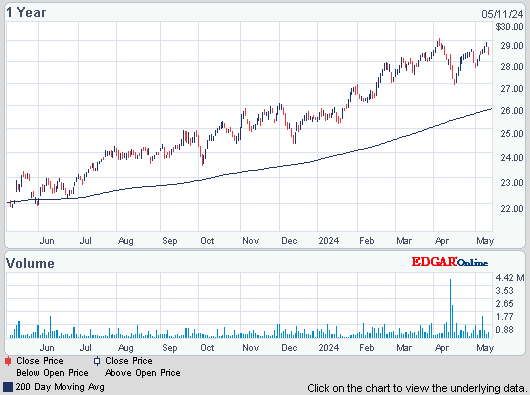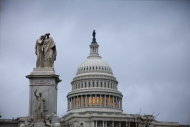Dow fell 58 (closing at the lows), decliners 2-1 over advancers & NAZ was off 20. The Financial Index lost 1+ to the 207s, a more than 2 month low. The MLP index eased fractionally lower in the 382s & the REIT index was off a few pennies in the 257s. Junk bond funds slipped & Treasuries were higher. Oil dropped for a 2nd day as the
Intl Energy Agency cut its demand estimate & US
inventories were expected to reach a 3-month high. Gold pulled back.

![Live 24 hours gold chart [Kitco Inc.]](http://www.kitco.com/images/live/gold.gif)

The EU edged closer to settling how to impose Basel bank capital rules on its lenders after officials & lawmakers drafted potential compromises on parts of the regulatory overhaul. They said a deal on the legislation was in sight following negotiations yesterday in Brussels. The measures, known as Basel III, would more than triple the core capital that lenders must hold as a buffer against insolvency, & require banks to meet minimum liquidity rules. The European Parliament has called for curbs on banker bonuses, too. It’s “possible and probable” that there will be an agreement on the draft law before the end of the year, Michel Baniet, the EU’s financial services commissioner, told ministers. The main outstanding issues are capital surcharges for systemically important banks & bonuses, he said. Nations are struggling to meet a Jan 1 deadline for starting to apply the revised Basel rules, which were drawn up by global regulators to prevent any repeat of the financial crisis that followed the collapse of Lehman Brothers. The Financial Stability Board said 2 weeks ago that only 8 of the 27 countries that drafted the requirements, known as Basel III, were ready for the 2013 start date. The measures are scheduled to phase in, & would fully apply from 2019. This is a major piece of legislation for intl banks.
EU Officials Draft Some Compromises on Basel Bank Law
Photo: Yahoo
The federal gov started the 2013 budget year with a $120B deficit in Oct, an indication that the nation is on a path to its 5th straight $1T-plus annual deficit. This is putting pressure on DC to seek a budget deal in the coming weeks. The Treasury Dept said that the Oct deficit was 22% higher than the same month last year. Tax revenue increased 13% from the same month last year to $184B. But spending rose 16.4% to $304B. Spending was held down last Oct by a quirk in the calendar: the first day of the month fell on a Sat, so some benefits were paid in Sep 2011. The deficit is the amount of money the gov has to borrow when revenues fall short of expenses. The gov ran a $1.1T budget deficit in fiscal year that ended in Sep, lower than the previous year but still painfully high by historical standards. There have been 4 straight $1T+s deficits, a first in history. If the economy goes over the fiscal cliff, this year's deficit would shrink to (only) $641B, according to the CBO. But the CBO also warns that the economy would sink into recession in H1 of 2013. If a budget deal is reached that extends the tax cuts & avoids the spending cuts, the deficit will end up roughly $1T. All numbers are whopper size.
US government runs $120 billion October deficit AP
Divisions among the 27 EU countries over increasing the region's €1T budget deepened as the region's 2 opposing camps set out their arguments over raising spending in the midst of a 3-year debt crisis. A group of 15 of the political leaders meeting in Brussels called for an increase in the EU budget, which is used to fund pan-European programs designed to ensure a level economic playing-field across the region. Meanwhile on a visit to Rome, Prime Minister Cameron of the UK called on the EU to "live within its means." One week ahead of a summit of all 27 countries on the budget, this decision reflected the unity of the mostly poorer member states which are counting on backing from a larger EU budget to get them back on track for economic growth. The 15 countries, ranging from Portugal in the southwest to Poland in the northeast, fear that the summit, which was called to set spending limits for the EU institutions thru 2020, will hit programs & funding they are counting on. EU Parliament President Martin Schulz said that "to cut the EU budget might be popular in some of the member states but it is absolutely counterproductive." The EU parliament needs to give its consent to any budget deal. The current budget proposals call for more than a €1T ($1.3T) spending ceiling for 2014-2020, but the UK wants to slash that by more than €50B ($64B). This is another manifestation of the euro debt mess.
Summit of 15 EU countries shows split on EU budget AP
Finally attention is being paid the approaching fiscal cliff & its consequences if there is no compromise in DC. Of course, waiting to the last minute for a mish-mash of who knows what is nothing to be proud of. The credit agencies are watching, waiting with more credit downgrades in hand. Europe continues to muddle along & China has to deal with a once in a decade change in leadership while the economy is only doing so-so. In less than a month, Dow has sunk 800 from its high to where it was in Jul. The bears remain in charge of the stock markets.

AMJ (Alerian MLP Index tracking fund)
Treasury yields:
U.S. 3-month |
0.086% | |
U.S. 2-year |
0.250% | |
U.S. 10-year |
1.589% |
| CLZ12.NYM | Crude Oil Dec 12 | 85.45 |
![Live 24 hours gold chart [Kitco Inc.]](http://www.kitco.com/images/live/gold.gif)

The EU edged closer to settling how to impose Basel bank capital rules on its lenders after officials & lawmakers drafted potential compromises on parts of the regulatory overhaul. They said a deal on the legislation was in sight following negotiations yesterday in Brussels. The measures, known as Basel III, would more than triple the core capital that lenders must hold as a buffer against insolvency, & require banks to meet minimum liquidity rules. The European Parliament has called for curbs on banker bonuses, too. It’s “possible and probable” that there will be an agreement on the draft law before the end of the year, Michel Baniet, the EU’s financial services commissioner, told ministers. The main outstanding issues are capital surcharges for systemically important banks & bonuses, he said. Nations are struggling to meet a Jan 1 deadline for starting to apply the revised Basel rules, which were drawn up by global regulators to prevent any repeat of the financial crisis that followed the collapse of Lehman Brothers. The Financial Stability Board said 2 weeks ago that only 8 of the 27 countries that drafted the requirements, known as Basel III, were ready for the 2013 start date. The measures are scheduled to phase in, & would fully apply from 2019. This is a major piece of legislation for intl banks.
EU Officials Draft Some Compromises on Basel Bank Law
Photo: Yahoo
The federal gov started the 2013 budget year with a $120B deficit in Oct, an indication that the nation is on a path to its 5th straight $1T-plus annual deficit. This is putting pressure on DC to seek a budget deal in the coming weeks. The Treasury Dept said that the Oct deficit was 22% higher than the same month last year. Tax revenue increased 13% from the same month last year to $184B. But spending rose 16.4% to $304B. Spending was held down last Oct by a quirk in the calendar: the first day of the month fell on a Sat, so some benefits were paid in Sep 2011. The deficit is the amount of money the gov has to borrow when revenues fall short of expenses. The gov ran a $1.1T budget deficit in fiscal year that ended in Sep, lower than the previous year but still painfully high by historical standards. There have been 4 straight $1T+s deficits, a first in history. If the economy goes over the fiscal cliff, this year's deficit would shrink to (only) $641B, according to the CBO. But the CBO also warns that the economy would sink into recession in H1 of 2013. If a budget deal is reached that extends the tax cuts & avoids the spending cuts, the deficit will end up roughly $1T. All numbers are whopper size.
US government runs $120 billion October deficit AP
Divisions among the 27 EU countries over increasing the region's €1T budget deepened as the region's 2 opposing camps set out their arguments over raising spending in the midst of a 3-year debt crisis. A group of 15 of the political leaders meeting in Brussels called for an increase in the EU budget, which is used to fund pan-European programs designed to ensure a level economic playing-field across the region. Meanwhile on a visit to Rome, Prime Minister Cameron of the UK called on the EU to "live within its means." One week ahead of a summit of all 27 countries on the budget, this decision reflected the unity of the mostly poorer member states which are counting on backing from a larger EU budget to get them back on track for economic growth. The 15 countries, ranging from Portugal in the southwest to Poland in the northeast, fear that the summit, which was called to set spending limits for the EU institutions thru 2020, will hit programs & funding they are counting on. EU Parliament President Martin Schulz said that "to cut the EU budget might be popular in some of the member states but it is absolutely counterproductive." The EU parliament needs to give its consent to any budget deal. The current budget proposals call for more than a €1T ($1.3T) spending ceiling for 2014-2020, but the UK wants to slash that by more than €50B ($64B). This is another manifestation of the euro debt mess.
Summit of 15 EU countries shows split on EU budget AP
Finally attention is being paid the approaching fiscal cliff & its consequences if there is no compromise in DC. Of course, waiting to the last minute for a mish-mash of who knows what is nothing to be proud of. The credit agencies are watching, waiting with more credit downgrades in hand. Europe continues to muddle along & China has to deal with a once in a decade change in leadership while the economy is only doing so-so. In less than a month, Dow has sunk 800 from its high to where it was in Jul. The bears remain in charge of the stock markets.







No comments:
Post a Comment